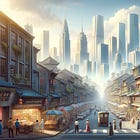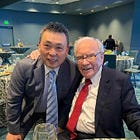Experiencing China’s rural healthcare: stories of a migrant family, doctor-patient conflicts and urban-rural disparities
Firsthand observations of a spring festival medical emergency in a small town
The Spring Festival travel rush in 2024 hit astonishing levels. According to the Ministry of Transport, an estimated 9 billion trips are expected this year, with car travel skyrocketing to 7.2 billion trips. This surge was likely due to traffic on national and provincial roads as families and friends gather.
Chinese culture places immense value on family bonds and social norms, shaping tight-knit and highly dynamic social networks. However, with the process of urbanization, a large number of people migrating between urban and rural areas have partially disrupted this pattern. Family members are dispersed across different regions, leading markedly different lifestyles, and consequently, relationships among people have undergone changes.
My family is a typical example of this urban-rural migration history over the past two decades.
The ordinary saga of a migrant family
My hometown, specifically where my parents were born and raised, lies in a typical county in Jiangxi Province, China's central region. According to the seventh national census data, the county's permanent population was 872,000 in 2022, with a slight increase of 0.04%, and 60% of the population living in rural areas. In the 1980s, my father left his hometown to join the military; in 2003, right after the SARS epidemic, our family moved to Shanghai with the military. I was six years old that year, my life yet to unfold.
As a second-generation migrant, my childhood was marked by constant relocation and adaptation, shuttling between urban and rural landscapes. Over twenty years of Spring Festival migrations, I witnessed the evolution from green trains to high-speed rail and highways. The county of my childhood now evokes both familiarity and strangeness. Familiar sights seem frozen in time—the deep blue windows and white tiles of my kindergarten, typical of the 1990s building decor; the river meandering through the old city center, with people strolling on floating bridges; rice grains laid out to dry on the roadsides in autumn…
Yet amid this familiarity lies the unfamiliar - the rapeseed flowers grown in the ruins of the demolished state-owned cinema; farmers, displaced from their fields and compensated with sizable government-built structures, now loiter beneath commercial storefronts, waiting for tenants to occupy their new spaces; the rearranged old streets where my parents and I once got lost; and the city's reputation for ceramics and lithium mines in its manufacturing sector—ALL reflect significant urban concepts such as construction, demolition, renovation, industrialization, and economic development.
This year's Spring Festival, like every year, I returned to my hometown with my parents, expecting a few leisurely days but unexpectedly facing a medical emergency.
Experiencing the vast disparity in urban-rural healthcare
While the disparities in public resources between urban and rural areas are evident, it wasn't until it directly affected my family's treatment plan that I truly grasped the magnitude of these differences.
COVID-19 as a remnant of the past, yet varied experiences across regions
On the eve of the Chinese New Year, my grandfather developed a high fever, shocking everyone when he tested positive for COVID-19 antigen. The surprise stemmed from two factors: firstly, despite the nationwide fever outbreak at the end of 2022 and early 2023 (right after China lifted its official restrictions over COVID-19), a year had passed, yet the COVID-19 virus still persisted; secondly, most locals in our hometown had never encountered the antigen.
In the tightly controlled environment of 2022, regular nucleic acid testing was required for access to public places, but only those in more developed regions had access to the quicker, albeit potentially less accurate, antigen tests. These tests were widely distributed in Shanghai during the 2022 lockdown. Interestingly, expired antigens remained effective - my grandfather used an antigen we brought back from Shanghai, a remnant of the city's lockdown in 2022.
The vast disparity in medical resources became even more apparent once my grandfather was admitted to the county hospital.
Inter-provincial medical "arbitrage" and looming doctor-patient conflicts
Upon arrival at the county hospital, my grandfather received a treatment plan consisting of a single, high-dose antibiotic injection. Having heard of the overuse of antibiotics in grassroots hospitals, I distrusted the county hospital's treatment plan. Seeking advice from a doctor friend in Shanghai, she suggested adding hormones, anticoagulants, reducing antibiotic dosage, and, most importantly, administering COVID-19-specific drugs.
Currently, there are only two ways to obtain COVID-19-specific drugs. The first is through the medical system, but even during the pandemic peak, my county's medical system had never acquired them. "This medication isn't meant for regions like ours," a young doctor remarked.
The second method is through public channels. I contacted a clinic in Wuhan (the capital city in Hubei Province) through an e-commerce platform, paid online, and asked them to deliver the drugs via express delivery. Fortunately, despite the uneven distribution of public resources, China flaunts a seamless and expansive logistics network — the drugs arrived within a day.
The next challenge was convincing the county doctors to adjust the treatment plan. "Using hormones? Only rural quacks would use hormones to reduce fever," the attending physician challenged. "Are you really from Shanghai?"
My heart sank. At that very moment, my grandfather lay in bed with a 40-degree fever, the COVID-19 virus raging, and antibiotics coursing through his veins, incongruously treating the virus while taxing his kidneys. Then after brief consideration, I signed a waiver and urged them to proceed with my proposed treatment plan.
Minutes later, I found myself in the doctor's office. A young doctor meticulously studied the instructions for the COVID-19-specific drugs, then called the chief physician for approval. Following their discussion, he suddenly lowered his voice, covered the receiver, and whispered, "The family doesn't seem like they're here to cause trouble." I was surprised; they seemed prepared for a potential conflict.
The 2018 "White Paper on the Practice Status of Chinese Physicians" revealed alarming statistics: 66% of Chinese physicians have faced medical disputes, with over 30% experiencing violence from patients. From 2009 to 2018, 295 incidents of medical staff injuries were reported, resulting in 362 injuries and 24 deaths among doctors (Source).
These figures and my own experience illustrate the tensions between doctors and patients, stemming from economic pressures on patients and their families, limited access to medical insurance, inadequate dissemination of medical knowledge, ambiguous responsibilities, and internal corruption within the healthcare system (brought to the public's attention by the media), fostering public distrust towards doctors in Chinese society.
Family matters: rebellious granddaughter challenged the authority
Amidst the vibrant festivities of the Spring Festival, my grandparents' home welcomed a constant flow of visitors through its wide-open doors. In the midst of this lively atmosphere, a middle-aged man arrived accompanied by two children. Observing me near the entrance, he sought guidance from my grandmother on how to address me. In her usual nonchalant manner, my grandmother responded, "Call her auntie." With a sudden realization, the man stepped forward, shook my hand, and addressed me accordingly.
“No”, my grandmother calmly interjected, "It's your children who should call her auntie."
I have always been the outlier in my hometown, an in-betweener straddling the urban-rural divide. I don't quite understand the local dialect and even don’t know the names of most relatives. Having grown up in a big city and studied abroad, I've been influenced by Western culture, and maintained a high sensitivity to the internet and abundant information.
In traditional beliefs, elder males hold the highest authority; women are expected to silently manage household chores, remaining invisible while ensuring everything runs smoothly. Yet, in this scenario, both as a granddaughter and a woman, I stood out conspicuously.
Not only did I offer suggestions and devise plans, but I also directed my father and uncles, even reprimanding them harshly when dissatisfied. Despite knowing this would secretly irk the elders, I remained undeterred.
All of a sudden, I realized that someone familiar with tradition but unbound by its value system could wield tradition as a weapon to achieve their goals. Under the guise of filial piety, I instructed my uncles to tend to my grandfather's illness. Each one was unwilling to bear the consequences or tarnish their reputation as unfilial, leading them to work diligently and effectively.
I would describe it as a simple yet cunning wisdom, a rebel against patriarchal norms.
Epilogue
My family's journey epitomizes the opportunities seized by my predecessors amid rapid economic growth. Transitioning from rural to urban life, they achieved upward mobility and supported extended family members for a better life.
As a second-generation immigrant, my feelings about my hometown are complex. Initially, returning filled me with a sense of superiority, carrying advanced material wealth, knowledge, and culture. Yet, witnessing the rise of consumption and innovative business models in lower-tier cities, I realized the potential of China's economy lies in these underdeveloped but burgeoning regions, humbling my arrogance.
However, infrastructure and public resources in these areas urgently need improvement. This necessitates ample financial support (likely derived from central government’s transfer payments and the local fiscal income), strengthened grassroots governance capability, and an influx of talent.
These transformations may involve a lengthy and arduous process, but I eagerly await their realization.
Related Reads








